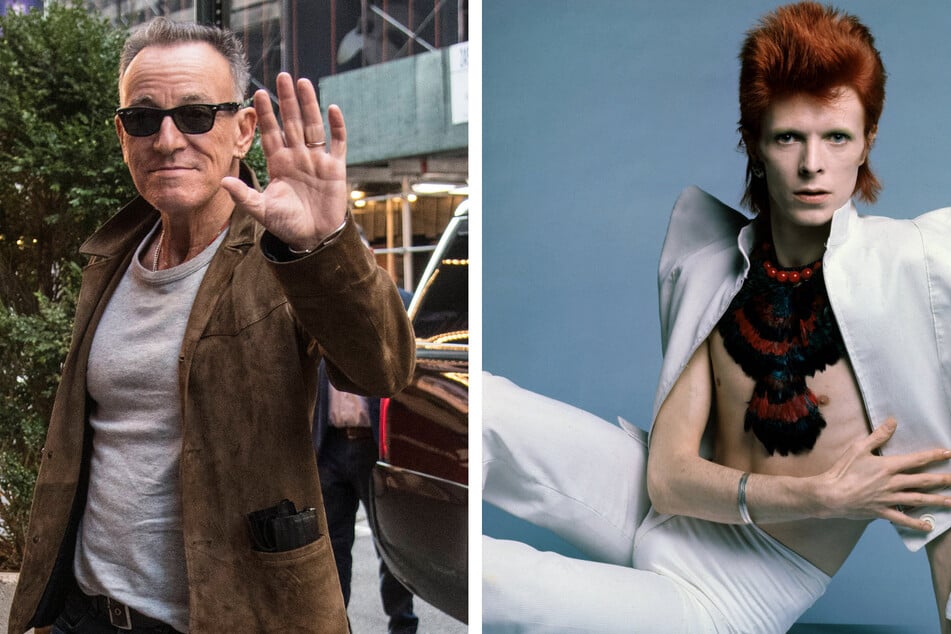Dylan, Springsteen, Bowie: Why stars are selling their song rights
London, UK – Record sales are plummeting worldwide, while the pandemic made it hard for artists to give concerts or go on tour. More and more musicians are selling their catalogs to make up their income, with the big names able to pull in hundreds of millions of dollars.

Just before David Bowie would have turned 75, his heirs gave themselves a sizeable present by selling the rights to his whole music catalog.
That drew in $250 million, according to Variety.
Bowie's oeuvre, spanning six decades, includes more than 25 studio albums with hits like Space Oddity, Changes, Heroes, or Let’s Dance. It now belongs to Warner Chappell Music.
Bowie, who died in 2016, is one of the latest of a series of major artists whose catalogs are now owned by big record labels and corporations.
Bob Dylan sold his music catalog, totaling some 600 songs, to Universal in 2020. Bruce Springsteen sold his entire body of work to Sony. John Legend, The Red Hot Chili Peppers, Shakira, Tina Turner, and many others have also made considerable sums by giving up the rights to their music.
That is due to dwindling record sales, as people turn to streaming platforms like Spotify, not to mention the slump in concert revenues because of the pandemic.
"I can’t work," American singer-songwriter David Crosby tweeted a year ago, announcing his decision to also sell his rights. "Streaming stole my record money... I have a family and a mortgage and I have to take care of them so it’s my only option."
Once a deal is made, it's hard to go back

Once sold, it’s difficult to get song rights back. But at least in the short term, artists get a good deal. The rock band Red Hot Chili Peppers are said to have made some $140 million in selling to British corporation Hipgnosis.
Universal paid Dylan some $280 million for the rights to his entire music catalog, according to media reports. Springsteen is estimated to top the list with a record sale of $500 million, a sizeable sum for a man whose songs address the plight of the working class.
Hipgnosis is considered a pioneer of rights management. The British investment firm was founded by Merck Mercuriadis, a music veteran who managed Beyoncé, Iron Maiden, and the Pet Shop Boys; and Nile Rodgers, the guitarist in disco-funk band Chic and producer for Duran Duran, Bowie, and Madonna.
American singer-songwriter Barry Manilow, Neil Young, and Shakira are also part of the company’s portfolio.
Often accused by fans of selling out on their idols, Hipgnosis has repeatedly said it only markets the music on the artists' terms, for example in advertising.
"Merck [Mercuriadis] has created a new type of music company and I’m looking forward to being part of the family," said Manilow when his deal was announced.
Short-term benefits vs. long-term restrictions

The step can make sense, especially for younger artists, as it can be financially rewarding even for just one song, as revenue from streaming platforms is relatively low compared to record sales, a problem often raised by musicians.
Radiohead’s lead vocalist Thom Yorke was considered one of the fiercest opponents of streaming services and refused to make his music available via Spotify and other platforms for a long time.
Pop star Taylor Swift even temporarily retracted her entire music catalog from all streaming services, in a move indicative of views of the payment model.
Swift holds even stronger views about song rights. The rights to her first six albums lie with record label Big Machine Records where she signed a contract as a 15-year-old assigning the publishing rights in advance.
Since then, the rights to her albums have been re-sold several times, but Swift never managed to buy them back. She has now started to re-record those six albums for her current label, Universal, to regain control over her work.
Quarrelling over song rights isn’t new in the industry.
In the 1980s, Michael Jackson bought the rights to the Beatles’ complete music catalog for some $45 million – a deal that didn’t go down well with ex-Beatle Paul McCartney. He had previously refused to buy the rights himself as he thought the price was too high.
The issue ultimately destroyed the friendship between Jackson and McCartney, who had recorded two songs together, The Girl Is Mine and Say Say Say, when Jackson let Nike use the Beatles' Revolution for a shoe commercial.
A decade later, the King of Pop sold the rights to the Beatles’ oeuvre again, making twice the sum he had paid.
Cover photo: Collage: IMAGO / Future Image & IMAGO / Prod.DB

